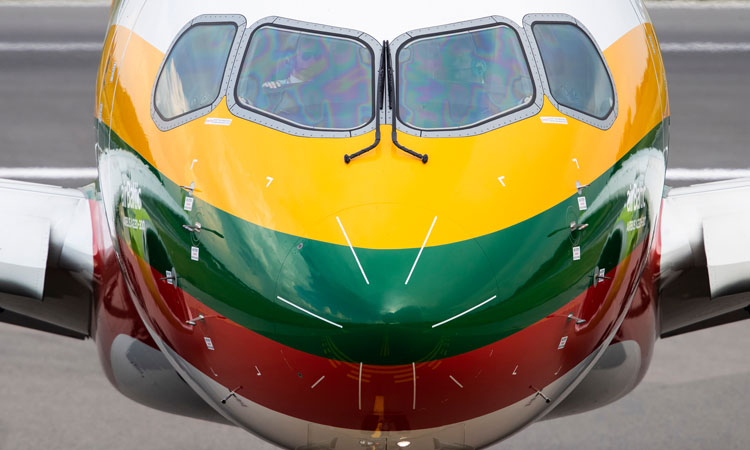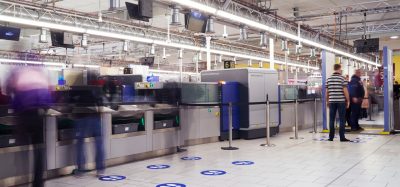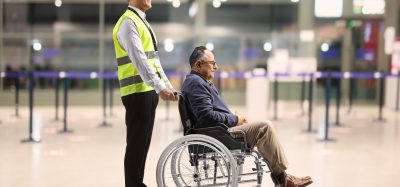Lithuanian Airports’ strategic goal
- Like
- Digg
- Del
- Tumblr
- VKontakte
- Buffer
- Love This
- Odnoklassniki
- Meneame
- Blogger
- Amazon
- Yahoo Mail
- Gmail
- AOL
- Newsvine
- HackerNews
- Evernote
- MySpace
- Mail.ru
- Viadeo
- Line
- Comments
- Yummly
- SMS
- Viber
- Telegram
- Subscribe
- Skype
- Facebook Messenger
- Kakao
- LiveJournal
- Yammer
- Edgar
- Fintel
- Mix
- Instapaper
- Copy Link
Posted: 5 January 2021 | Lithuanian Airports | No comments yet
The year 2019 saw Lithuanian Airports support its highest number of PRMs across its network of airports, with as many as 56 per cent being satisfied with the accessibility services on offer. However, ensuring equal access to services is a priority for the operator, and Lithuanian Airports continues to work hard to deliver on this goal across its three airports.


Year on year, Lithuanian Airports continues to work towards becoming a convenient place of travel for each and every passenger. Each year, the organisation makes consistent efforts to ensure equal access for all customers, with a wide range of appropriate, high-quality services and comfortable travel. Existing services are regularly reviewed and upgraded, while innovation is becoming more common, as it is often the airports that set the standard for attaining a better passenger experience in the market.
Accessible airport infrastructure
In recent years, Lithuanian Airports has significantly enhanced the infrastructure adapted for passengers with special needs or reduced mobility. This was facilitated by a significant increase in the number of these passengers.
It is estimated that, during 2019, Lithuanian Airports served more than 11,000 requests for passengers with reduced mobility (PRMs) and other disabilities – an increase of as much as 36 per cent in comparison to previous years. The aim is for passengers with additional needs to feel comfortable at the country’s air gateways. Therefore, airports specifically focus on ensuring their streamlined travel experience. All three air gateways in the country have approved aid quality standards in place. In addition, interoperability technology for serving PRMs has been introduced.
The Hidden Disabilities Sunflower
The general practice of Lithuanian Airports shows that even a small change can bring significant and important added value to travellers. This is reflected in the actual experience of Lithuanian Airports. In 2020, the country’s air gateway joined an international social project: The Hidden Disabilities Sunflower. The purpose of this project is to assist people with hidden disabilities in identifying their needs better and aid the employees of the airports in recognising passengers who have disabilities that are not always obvious, as well as providing necessary assistance on time.
Survey data suggests that 74 per cent of individuals with hidden disabilities do not use any aids – such as wheelchairs, for example – which would enable others to perceive their actual health condition. Therefore, a subtle yet visible international symbol of a sunflower was designed for this purpose; helping to identify that a person wearing this flower may be in need of additional assistance. Lithuanian Airports was the first in the Baltic States to join this initiative. The sunflower symbol is already identified at the biggest airports of the world, in Canada, Australia, the U.S. and other countries.
Kiss and Fly
The main aim is to build a positive experience for everyone using Lithuanian Airport services, beginning at their arrival. For this purpose, Vilnius Airport (VNO) operates the ‘Kiss and Fly’ car runway barrier system – similar zones are operating at Kaunas Airport (KUN) and Palanga Airport (PLQ), as well. This short-stop system allows drivers to make convenient and free stops in front of the departures terminal for up to 10 minutes in the controlled area. This system reduces traffic congestion near the constantly bustling airport and provides passengers, in particular PRMs, with comfort and a feeling of safety. All three of the country’s air gateways are easily accessible by public transport. Importantly, Lithuanian Airports cooperates with the National Institute for Social Integration, providing the ‘Social Taxi’ service and the Order of Malta helpdesk, delivering service for passengers with special needs.
Pre-booked assistance services
At all three airports, an assistance service for passengers with disabilities or temporary mobility restrictions can be pre-booked. By pre-booking this service or using the special assistance buttons installed throughout all three air gateways, passengers can use a wheelchair and benefit from an accompanying staff member who helps to perform the necessary airport procedures (escort to boarding gates or help after getting off the plane etc.). Moreover, PRMs have priority at security checks and with border control procedures, meaning that there is no need to wait in a queue.
A positive PRM passenger experience
Periodic surveys of PRMs also show that the assistance services are in demand and highly welcomed. According to the surveys, every second passenger with a disability is aware of the assistance service at the airport and has already used it.
Research on passenger experiences reveal the general attitudes of passengers about the availability of such services. For example, according to the Sociological Survey of Departing Passengers (NPS), in the first half of 2019, the total number of passengers satisfied with the accessibility services of Lithuanian Airports amounted to as much as 56 per cent and exceeded the number of passengers by two per cent compared to the indicator at the end of 2018.
Meanwhile, Vilnius Airport’s passenger assessment results of the ASQ (Airport Service Quality) programme conducted by Airports Council International (ACI) reached the indicator of 4.11 points (in a five-point scale) in 2019. More than 340 airports worldwide participate in this airport quality assessment programme and Lithuanian Airports occupies eighth place among 19 European airports, serving two to five million passengers a year. The consistently improving results are due to higher ratings of passengers for staff courtesy and public transport services, as well as better availability of luggage trolleys, reduced waiting times at the passport control queues and cleaner toilets.
Lithuanian Airports believe that the customer experience areas will help to maintain a multi-purpose approach to the availability of services to all passengers, improve existing services and introduce new ones.
Issue
Related airports
Kaunas International Airport (KUN), Palanga Airport (PLQ), Vilnius International Airport (VNO)


















